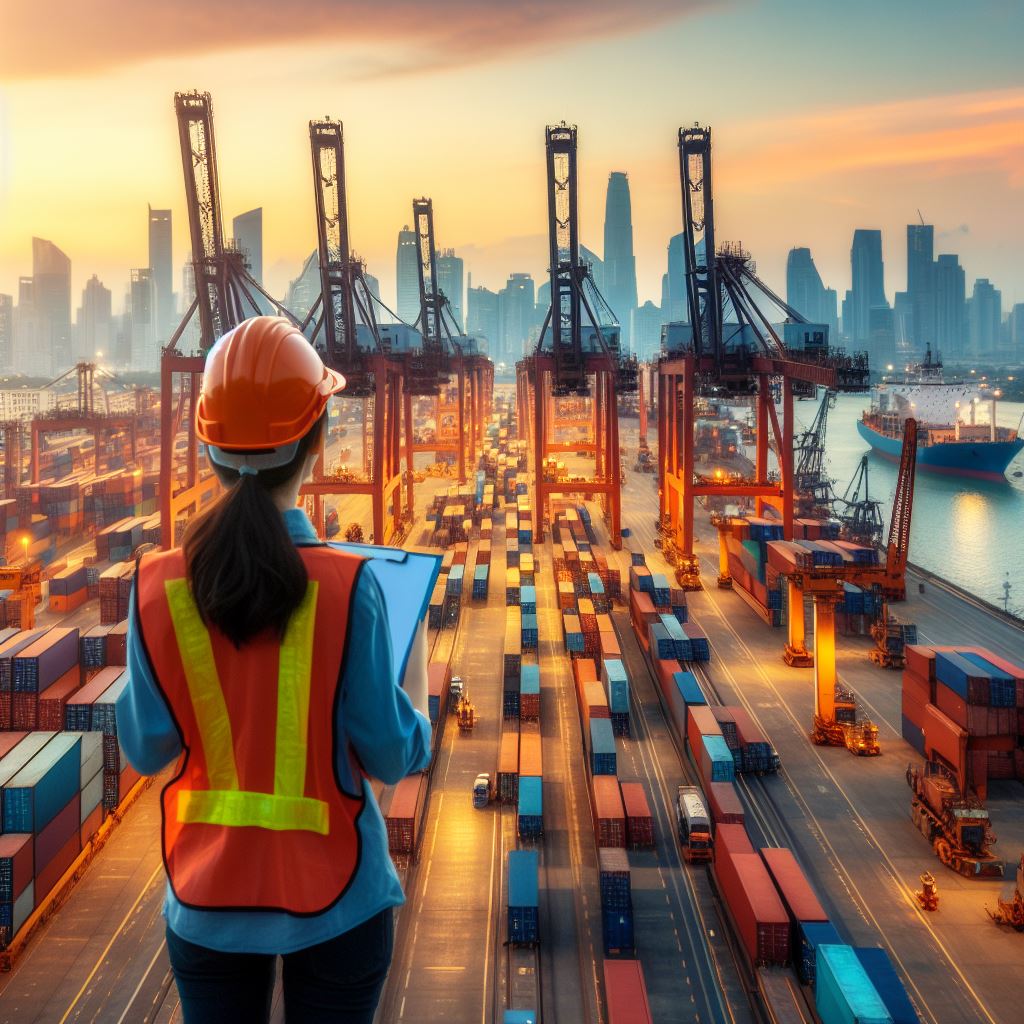How AI is Revolutionizing the Future of Transportation and Logistics
In the dynamic tapestry of technological innovation, the fusion of artificial intelligence (AI) with transportation and logistics is bringing about a symphony of change. Envision a future where the movement of goods is a precisely choreographed dance, guided by algorithms and powered by the seamless efficiency of AI. In this exploration, we delve into the transformative journey of AI within transportation and logistics, unraveling how it’s not just a technological advancement but an unparalleled revolution shaping a future of unprecedented possibilities.
How AI is changing Logistics Optimization
AI algorithms are revolutionizing supply chain management by offering a real-time, data-driven approach to inventory control and demand prediction. AI’s role in optimizing the supply chain is pivotal for modern logistics. Through advanced algorithms and real-time data analysis, AI streamlines inventory management, demand forecasting, and order fulfillment. These innovations reduce operational costs and enhance overall supply chain efficiency.
Streamlining Supply Chain Management
Navigating the intricacies of supply chain management is like solving a complex jigsaw puzzle. From procurement to delivery, each piece must seamlessly fit for the business machinery to operate smoothly. This is where AI steps in as the master puzzle solver, analyzing vast datasets to optimize each facet of the supply chain.
One of the primary challenges in supply chain management is maintaining optimal inventory levels. AI algorithms, leveraging historical data and predictive analytics, automate inventory control processes. This not only prevents stockouts but also reduces excess inventory, freeing up capital for other crucial aspects of the business.
Predictive Maintenance
At the core of predictive maintenance lies the ability to anticipate equipment failures before they disrupt operations. Machine learning algorithms, fueled by historical data and real-time sensor information, become the fortune tellers of logistics machinery. They identify subtle patterns and anomalies that may elude the human eye, providing an invaluable window into the health of critical equipment.
The ability to predict equipment failures doesn’t just stop at anticipation; it extends to the optimization of downtime. Machine learning algorithms forecast when maintenance is most likely needed, allowing businesses to schedule downtime during periods of lower operational impact. This strategic approach ensures that maintenance activities are proactive rather than reactive, minimizing disruptions to the overall logistics flow.
Automated Route Planning and Traffic Management
AI-driven automated route planning serves as the conductor in logistics, which harmonizes the elements of time, cost, and environmental impact.
Automated route planning powered by AI goes beyond simple navigation. It delves into a realm where algorithms analyze multiple variables such as traffic patterns, delivery schedules, and efficiency. The result is a logistics symphony where routes are optimized for maximum efficiency.
Through predictive analytics, AI identifies potential traffic bottlenecks, accident-prone areas, and dynamically adjusts routes to enhance overall road safety.
Urban Logistics Challenges
Urban logistics operations must navigate a complex web of local regulations and restrictions. AI-powered compliance tools help businesses stay informed about the ever-evolving regulatory landscape. By adherence to local regulations, businesses can avoid disruptions and legal challenges, for a smooth and compliant urban logistics operation.
Self-Driving Trucks and Delivery Systems
The realm of long-haul transportation is being redefined by the emergence of self-driving trucks. AI algorithms, equipped with advanced sensors and real-time data processing, enable these vehicles to navigate highways with precision. The result is a transportation revolution where the limitations of human drivers are transcended, offering continuous, safe, and efficient journeys as a result.
Safety is paramount in the realm of transportation and self-driving trucks prioritize it above all. When it comes to Self-driving trucks, AI prioritizes safety above all through its ability to react in milliseconds to changing road conditions and potential hazards. The road becomes a canvas where accidents are minimized and safety takes center stage.
The last mile of delivery, often the most challenging, witnesses a paradigm shift with the introduction of autonomous delivery vehicles. AI algorithms, fine-tuned for urban navigation, enable these vehicles to navigate through intricate city landscapes with agility.
Energy-Efficient Logistics Operations
Algorithms carefully analyze data to identify inefficiencies in energy consumption throughout the supply chain. Whether it’s optimizing transportation routes, managing warehouses, or selecting eco-friendly packaging, AI becomes the driving force behind each decision to reduce the carbon footprint.
Warehouses, often the hubs of logistics operations, witness a transformation into smart, energy-efficient spaces. AI optimizes lighting, heating, and cooling systems based on real-time occupancy and activity data. The result is not just cost savings but a commitment to energy conservation that extends across every square foot of storage.
AI’s impact on energy efficiency extends to the selection of transportation modes. By analyzing factors like distance, payload, and fuel efficiency, AI algorithms determine the most energy-efficient mode for each leg of the journey. This reduces costs and aligns logistics operations with eco-friendly practices. Through intelligent design and material selection, AI ensures that packaging serves its protective purpose without contributing unnecessary waste to landfills. Each parcel becomes a testament to both care and environmental responsibility.
The Challenges with AI Integration
While the promise of AI in logistics is immense, the journey toward implementation is not without its challenges. Businesses encounter hurdles that range from technological complexities to organizational resistance. Addressing these challenges head-on is crucial for a successful integration of AI into logistics operations.
The integration of AI technologies into existing logistics systems can be intricate. Compatibility issues, system overhauls, and the need for advanced infrastructure pose significant challenges. Overcoming these complexities requires a strategic approach, often involving phased implementations and robust compatibility testing.
The vast amounts of data required for effective AI operations raise concerns about security and privacy. Protecting sensitive information while harnessing the power of data for AI analytics requires strict cybersecurity measures. Businesses need to establish trust by implementing encryption, access controls, and regular security audits.
The Human Element of AI
In the age of AI, the role of human expertise remains irreplaceable. While technology streamlines processes, the human element introduces creativity, adaptability, and a deep understanding of logistics intricacies. Achieving harmony between AI and human teams is pivotal for maximizing the benefits of AI in logistics.
Rather than replacing human roles, AI should be viewed as a collaborative partner. Human expertise brings a contextual understanding that complements AI’s analytical capabilities. This collaboration enhances decision-making, ensuring that logistics operations benefit from the best of both worlds.
As AI technologies evolve, so must the skillsets of the human workforce. Training programs and upskilling initiatives become essential to empower employees with the knowledge and expertise required to navigate and leverage AI tools effectively. Fostering a culture of continuous learning is key to ensuring a workforce that remains agile in the face of technological advancements.
Conclusion
In the dynamic realm of transportation and logistics, the integration of artificial intelligence (AI) has propelled the industry into a new era of efficiency, sustainability, and innovation. As we navigate the transformative landscape shaped by predictive maintenance, automated route planning, self-driving vehicles, energy-efficient logistics, and more, the impact of AI on operations is undeniable.
At RTS Labs, we stand at the forefront of this technological revolution, empowering businesses to overcome implementation challenges and harness the full potential of AI. Our commitment to navigating the complexities of technological integration, addressing data security concerns, and fostering a collaborative synergy between AI and human expertise positions us as your trusted partner in embracing the future of logistics.






